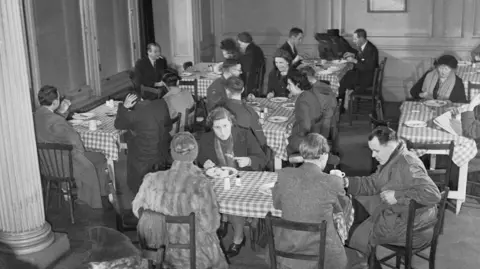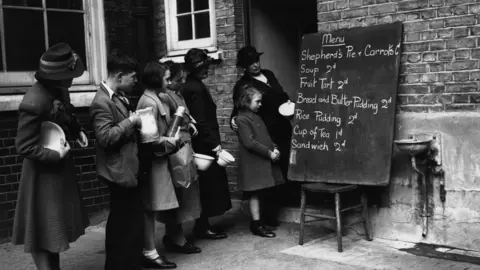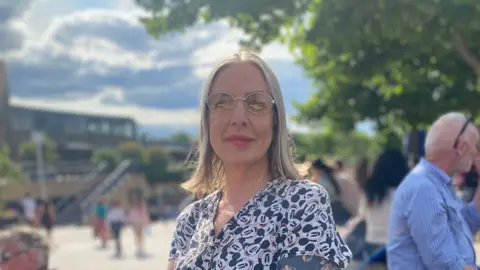Could wartime-inspired restaurants tackle food inequality?
 Getty Images
Getty ImagesIn the words of senior research fellow Dr Marsha Smith, "we all deserve nice things. Everyone deserves a good, nutritious meal".
But for various reasons, not everyone has regular access to them.
Now a solution could be found through the civic restaurants wartime initiative, which brought communities together over a warm dinner at a time of hardship.
Research into a new "public restaurant", due to open in Nottingham in spring 2026, will help to understand whether society could benefit from a similar model today.
Hilary Silvester was about 10 years old when she came across the communal kitchens for the first time in the 1940s, as she walked along Broad Street in Nottingham city centre.
What is now the Broadway Cinema was a wartime diner, offering daily meals to the public.
"What is British food? I wondered. Not very interesting at that stage.
"It was very plain food, but quite nourishing," the now 88-year-old, of the Nottingham Civic Society, said.
Hilary said between World War One and World War Two, civic restaurants - as they were known - were commonplace in Britain.
The taxpayer-funded eateries were formally brought into law as part of the Civic Restaurants Act 1947, which gave local councils the power to establish and run restaurants to provide meals and at reasonable prices.
That followed the British Restaurant scheme during World War Two, initiated by the food minister at the time, Lord Woolton, which provided one affordable hot meal a day per person.
In a debate during the second reading of the Civic Restaurants bill in the House of Lords in March 1947, it was described as "small in size but important in its social purpose".
 Harry Todd/Fox Photos/Getty Images
Harry Todd/Fox Photos/Getty ImagesThe menu of Nottingham's Broad Street kitchen in the 1940s offered a few simple options - sausages, shepherd's pie, boiled potatoes, sometimes mash, and boiled fish, Hilary recalled.
"There was nothing fancy about it. It was good food to provide sustenance at reasonable prices.
"British restaurants really belonged to that life where you made the best of what you got.
"The government and the councils, they were doing the best they could with the supplies available. A very different world," Hilary added.
But even in today's world, Dr Marsha Smith, from the University of Nottingham, thinks there is a market for "social eating".
"It [the British Restaurants scheme] was one of the biggest public health interventions in the UK, there were more of them than there are McDonald's now.
"They were hugely popular and widely used," she said.
 Dr Marsha Smith
Dr Marsha SmithShe added at the time, the government made grants available so the restaurants could be decorated.
"The idea was that they were not made to be poverty spaces," she said.
The restaurant project has also been inspired by current social eating initiatives in countries like Brazil and Poland.
Dr Smith, whose background is in the community food sector - has spent the last 15 years setting up "social eating spaces" - places anyone can go to share a meal with others.
She and Dr Simon Welham, also from the university, are part of the research team that will evaluate the impact of the public restaurants.
She said: "I'm really interested in giving people opportunities to sit and eat meals together because I think it's one of the most fundamental activities that humans undertake and it does so much more than just feed us physically.
"It really helps us to bond socially and it helps us to build community. It's actually really good for our health over the longer term."
She added: "What we learned at the time of the pandemic is that at times of crisis, other than health, food and social connections became incredibly valuable currencies."
How will the project work?
The project, named DISHED, has been be funded by about £1.5m from UK Research and Innovation and will be led by the Institute of Development Studies at the University of Sussex.
Two trials of subsidised restaurants will take place - one in Nottingham and one in Dundee - as part of government efforts to tackle food inequality.
The pilot will run as a research project for 14 months, during which their impact will be measured and evaluated.
They will be shaped by local businesses, people, local government and others - and open to everyone.
Dr Welham said the pilot was a "test and learn approach".
Locations, menus and prices would be decided collaboratively, he added.
Dr Smith said: "We know that in other countries these sort of public restaurants and public canteen initiatives sit amongst all sorts of other for profit business and within the commercial sector.
"It's really about diversifying choice, it's about giving people options to access good quality nutritious meals, eating in sociable settings."
Community support urged
Any wider rollout of public restaurants would depend on the research, Dr Smith said.
She added the restaurant model would be akin to leisure centres, public libraries, parks and museums.
"I think we really ought to be thinking about how we raise the standard for our public infrastructures," she added.
Dan Lindsay, managing director of several restaurants in Nottingham city centre - including Bar Iberico and Iberico World Tapas - said the pilot was a "great idea".
"The alternative of fast food is always there and easier, and if there's another option where people could be more healthy, that could be a really positive thing for people," he said.
Acknowledging the challenges faced by the hospitality industry, he said the "pool of people dining out" was smaller than it used to be.
Dan was a co-owner of fine dining restaurant World Service restaurant, which closed in 2024, after 24 years.
"I'd be lying if I didn't say we don't need any more challenges, but I think it would be a good thing for our community to get behind," he added.
Follow BBC Nottingham on Facebook, on X, or on Instagram. Send your story ideas to [email protected] or via WhatsApp on 0808 100 2210.
